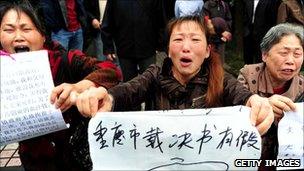China corruption problem 'still very serious' - report
- Published

There was public anger over the activities of Wen Qiang, executed after he was convicted of rape and taking bribes
China says its corruption problem is "still very serious" and has set out new measures to tackle it.
In a new report on the fight against corruption, the authorities say more than 200,000 cases have been investigated since 2003.
They say their efforts to date have "yielded notable results" but resolve to make them more effective.
Critics say that corruption is ingrained in the system and new regulations will not solve the problem.
The report carried by the official state news agency Xinhua, external says that between 2003 and 2009, prosecutors investigated more than 240,000 cases, including embezzlement and bribery.
It highlights new rules requiring members of the governing Communist party to report incomes and investments.
The party also says it will curb excessive spending on official parties and seminars.
The document praises the role of the news media and the internet in exposing corrupt practices, declaring that "sunshine is the best antiseptic".
'Huge sums'
The report acknowledges that tackling corruption will be a massive task.
"Since the relevant mechanisms and systems are still incomplete, corruption persists, with some cases even involving huge sums of money," it says.
"The situation in combating corruption is still very serious, and the tasks are still abundant."
China has launched several anti-corruption campaigns in recent years.
One of the biggest involved a powerful party boss in Shanghai, Chen Liangyu, who was jailed for 18 years in 2008 for his role in a pension fund scandal.
In July 2010, the top justice official in the city of Chongqing, Wen Qiang, was executed after being convicted of accepting bribes, rape and shielding criminal gangs.
- Published7 July 2010